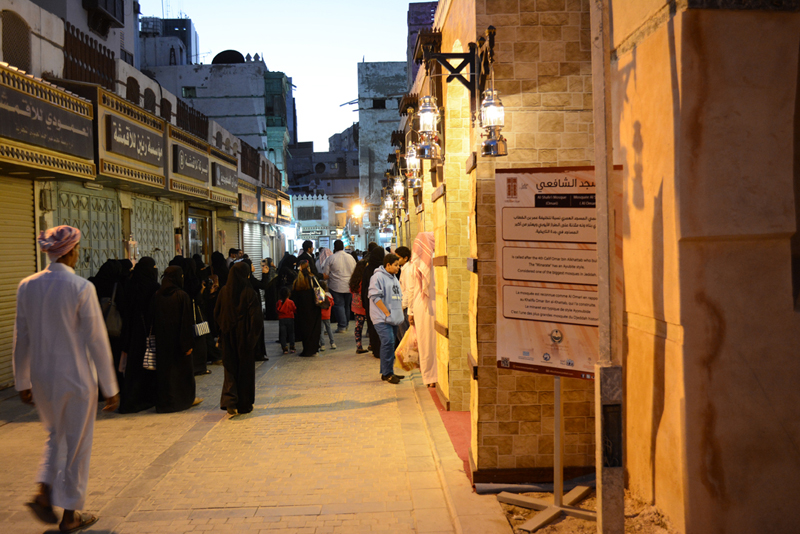JEDDAH: In comparison with the developments of modern urban infrastructure, Jeddah’s ancient port center of Al-Balad has largely stood the test of time.
Although Al-Balad has been a UNESCO Cultural Heritage Site since 2014, many of its historical buildings have perished due to fire and disrepair. In the past 50 years, UNESCO has served to provide the incentive to preserve historical sites such as Al-Balad, which is considered a staple of Hijazi architecture.
Assisting in these efforts is a Saudi-based 3D surveying and mapping firm called FalconViz, which uses state-of-the-art drone technology and Autodesk software to document and register these historical buildings for the preservation of future generations.
Founded in 7th century C.E., the ancient town of Al-Balad once served as the center of trade and commerce for the city of Jeddah. As centuries passed, most of the ancient walls that had surrounded the town, and the souq within it, became weathered and eventually torn down. As wealth from oil began to flow into the Saudi economy, the country began a march toward a more gleaming infrastructure complete with modern buildings. Many residents moved out of the cramped spaces of Al-Balad, leaving its more palatial homes and buildings to slow dilapidation. What remains, though, are truly exemplary remnants of ancient building styles that are seldom seen elsewhere in Saudi Arabia.
Tackling historical buildings from new angles
Al-Balad fully embodies traditional architecture, with its use of cut coral stones and intricately hand-carved “rawashin”-style latticed windows. It is one of the few remaining locations where such architectural styles can be seen first-hand, and holds a cultural and historical significance that is particular to this region.
Khaled Abdelgawad, director of business development and acting operations manager at FalconViz, explained how Al-Balad has an invaluable archaeological and architectural heritage.
“It is a cultural symbol that can serve both as a tourist attraction and an invaluable memory of an era of Saudi Arabia before oil,” he said.
However, preserving ancient buildings in this historic quarter comes with its own set of obstacles. One of the biggest challenges in Al-Balad is the tight spaces between buildings.
“Using traditional methods to record and preserve ancient buildings would take a long time, require several teams of people and would also not be precise or accurate, particularly in the case of unique details. Unfortunately, it has been the norm for most projects in Saudi Arabia until maybe 20-30 years ago,” Abdelgawad said.
With the advent of laser-scanning technology and photogrammetry, the procedure has become exponentially more efficient. Together with drones, an area of particular expertise for FalconViz, previously inaccessible areas of Al-Balad can now be documented for more accurate preservation.

Historical buildings in Jeddah’s Al-Balad area, one of the UNESCO-listed heritage sites in Saudi Arabia. (AN photo by Huda Bashatah)
Breathing new life into the old
Each drone sweep is an extensive aerial and terrestrial 3D scan of Al-Balad, and produces dozens of images of a building, along with hundreds of images that create a complex point cloud of data. Every point is able to accurately provide coordinates and true color markers to support all facets of the buildings, from its complex Hijazi facades to its structural nodes.
Unlike the common method of point cloud meshing — which can be inaccurate, overloads rendering and creates unnecessarily large files — FalconViz directly imports the point cloud into what is known as AutoCAD, enabling a detailed 3D model to be created that preserves even the minutest structural details.
“Autodesk tools like ReCap, Revit, and 3ds Max provide us with accurate drawings of sections, elevations, and structures of buildings,” Abdelgawad said. When combined with Building Information Modeling (BIM) tools and processes, it provides previously unavailable capabilities. “We can use these models to run various stress tests and simulations, like fire safety. We can plan for emergency response teams, evacuation routes and many other scenarios due to the high accuracy of the models,” he said.
The team at FalconViz then makes use of the highly accurate point cloud data to take measurements and accurately extract a CAD solid model of the building. Since all measurements are accurate to 1cm, final as-built plans can be generated for any of the modeled buildings from the original Structure via Motion (SfM) scan.
“Thanks to drone technology and the capabilities of Autodesk software, we can now do in a day what it would take a number of teams at least a month to complete. This has a positive domino effect on costs, manpower and efficiency. It also gives the Saudi authorities in charge of restoring and maintaining the Al-Balad area a comprehensive model to refer to when necessary. For example, there was a fire that destroyed a few very old buildings some months ago. Without the accurate models we helped construct, these buildings would be lost forever. Now, they can still be restored,” Abdelgawad said.
Documenting the past to preserve future
FalconViz’s mission is to “digitally document the world.” They provide and use the latest drone technology to “assist, improve, and accelerate the process of documenting a city’s most valued cultural assets.
“This project was one of our first, and one of the first in Saudi Arabia, and we are very proud to be a part of this renewed effort to carefully restore these cultural treasures that are an intangible part of human culture and history,” Abdelgawad said.
The benefit is twofold, as the same technology that is being used for preservation is used toward the development of modern urban infrastructure, planning, and construction. It is this diverse dual use of drone technology that is helping to preserve these ancient structures and restore them to their former glory.




















